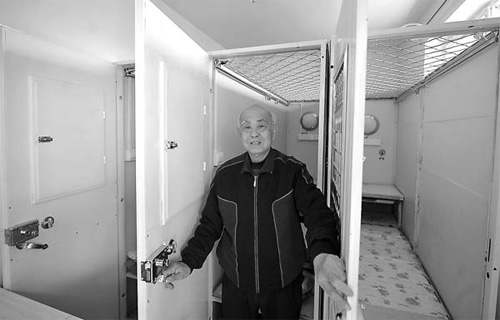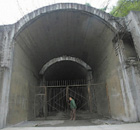Profiles
Small rooms, big dreams
By Yang Wanli (China Daily)
Updated: 2010-04-14 07:19
 |
Large Medium Small |
78-year-old retired engineer builds capsule hotel for Beijing's 'ant tribe'
Beijing - Huang Rixin thinks it's time to do something about Beijng's "ant" problem.
In this case, the ants are new graduates who make little money and are forced to live together in small cramped apartments - like ants.
 Huang Rixin, 78, a retired engineer, in the capsule hotel he built in Liulangzhuang, Haidian district, Beijing.[Xinhua] |
"I feel very sad to see these people, who are the same age as my grandchild, live this way and I want to help them," said the 78-year-old retired engineer.
Inspired by a newspaper article about capsule hotels in Japan - tiny rooms that only fit one person yet provide amenities and privacy - the one-time designer of hydroelectric stations turned his attention toward building better accommodation for the city's "ant tribe".
| ||||
On the third floor of a simple three-story building in Liulangzhuang, Haidian district, Huang rented three rooms and renovated them into eight units.
The place is less than 2 km from Zhongguancun, the electronics center in Beijing and a place many young college graduates work.
Tens of thousands of new grads in the area often share rooms. They generally make less than 2,000 yuan ($290) a month and pay at least 150 yuan for housing, with six people sometimes living together in a 10-square-meter apartment.
The municipal government is planning to build low-price accommodation for the ant tribe, but Huang estimated the newly-built apartments might only be enough for 20,000 people.
"What about the other 30,000 people? I'm still worried about whether they can afford the price of such an apartment," Huang said.
"For old people like me who have been working for the State my whole life, the State provides me with security," he said.
However, young people in the ant tribe are scrambling in the market economy and they are fighting for their own future, Huang said.
He has been receiving dozens of inquiries from potential tenants and reporters every day in the past two weeks.
"All the units are rented now. Seven tenants are college graduates and the other is a 35-year-old writer who wanted to learn from the experience of living here," he said.
The first tenant moved in on Thursday.
Zhang Qi, 25, a native of Shanxi province who works in an advertising company in Beijing, said she used to share a room with others and now she's got some space to herself.
She said she planned to live here for at least a year, "or, if possible, I'll live here until I get married."
At 2.4 meters in length, 0.72 meters in width and 2 meters in height, the small capsule apartments provide a bed, table, seat, TV set and Internet connections - enough to give new graduates their start.
Sun Changyun, a college student from Shenyang, Liaoning province, was among six volunteers who tried out the capsule apartment on April 3.
"Although the room is quite small, it belongs to me, like my own house. I can listen to my favorite music in it, or watch movies without any interruption. It's maybe a little cold in this small room, but I believe it will be a new fashion among the youth," Sun said in his blog.
"I feel bored living alone after graduation. If I can live in this kind of an apartment with other graduate students, it could be the happy family I've dreamed of having," he said.
Huang said he can only afford those eight units and is not planning to build more.
"The capsule apartment may not be a way to resolve living problems for everyone, but it's a possible choice for some of them," he said.
He spent about 40,000 yuan to build the capsule apartment with fire-resistant material and pays 2,000 yuan rent every month for the three rooms. At only 250 yuan per month for a room in the capsule apartment, he is not going to recoup his costs.
"It's not for money, but my way to help these low-income youth. I saw many people talking about my apartment recently and there were migrant workers planning to move in. I believe it will be popular in the future," he said.
China Daily










